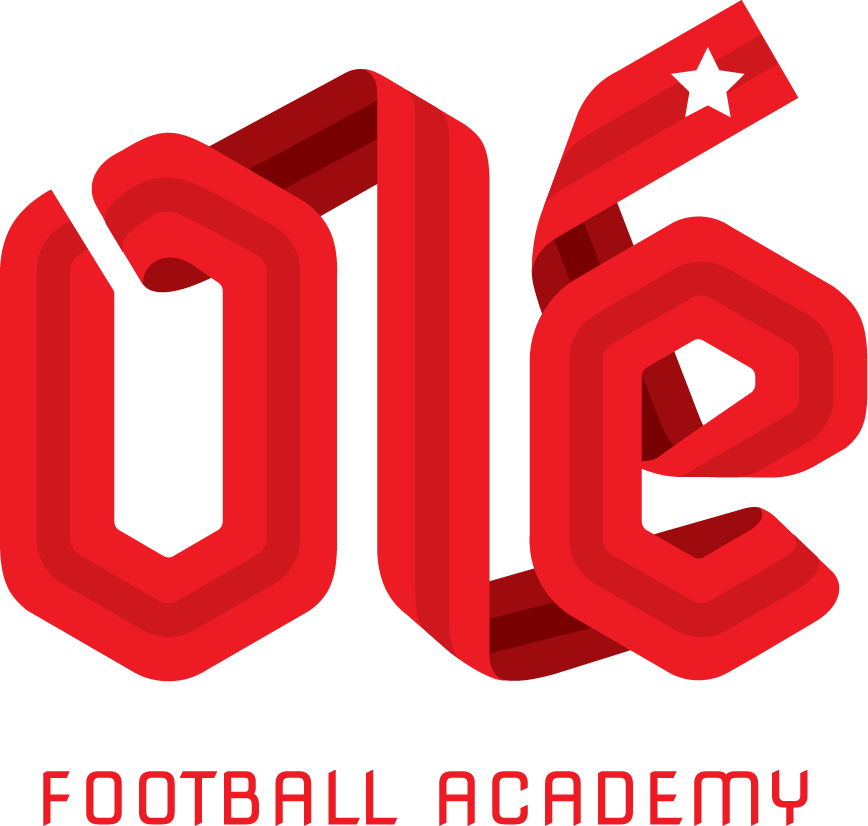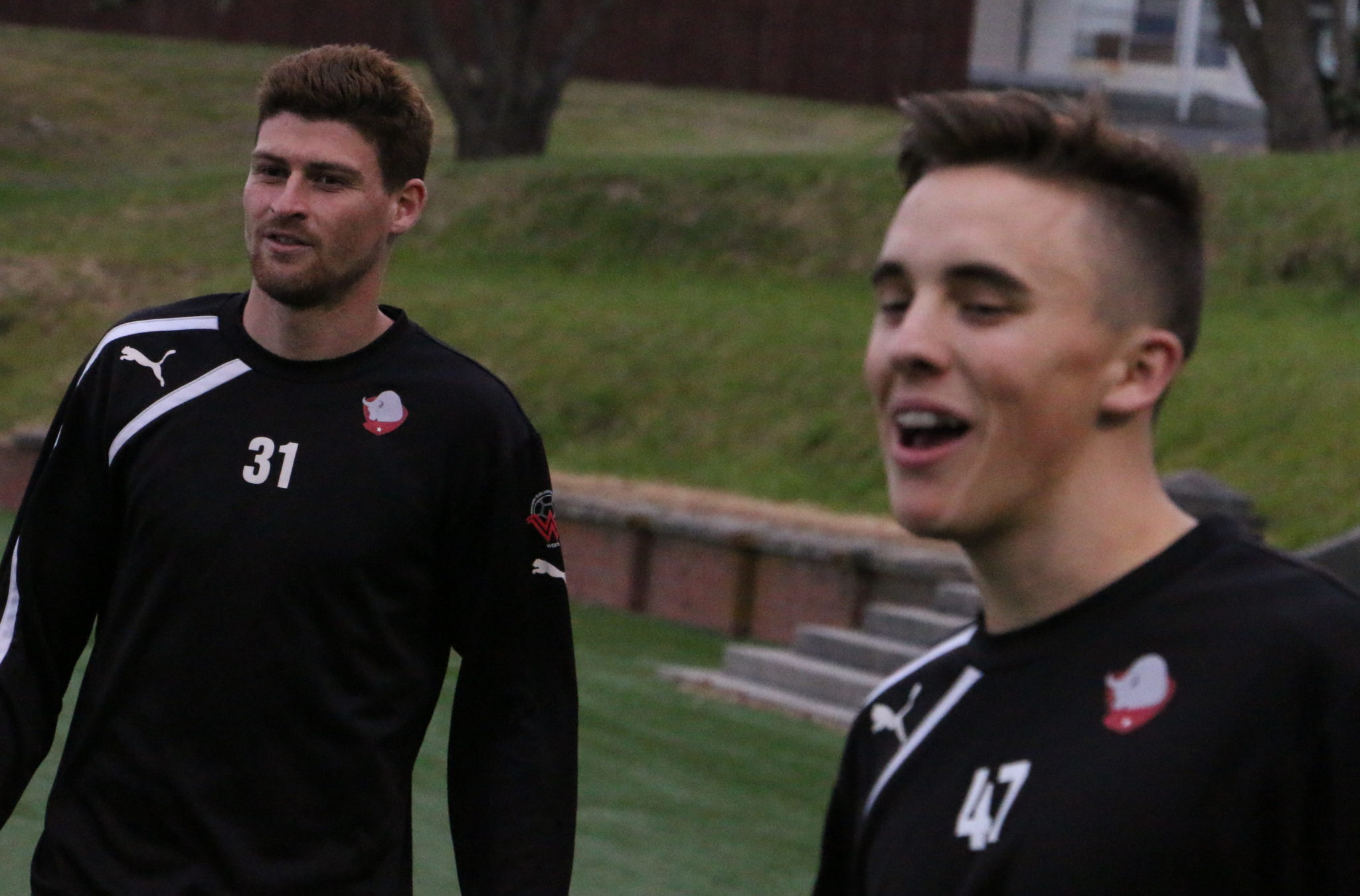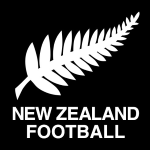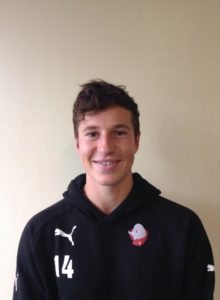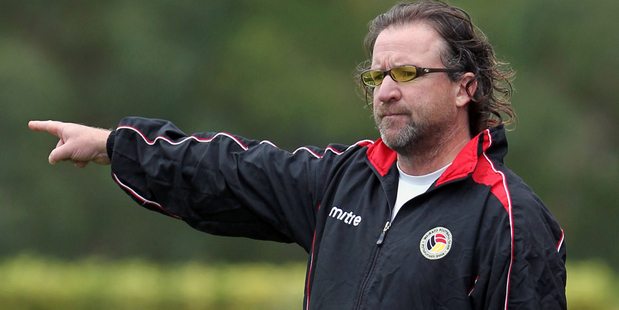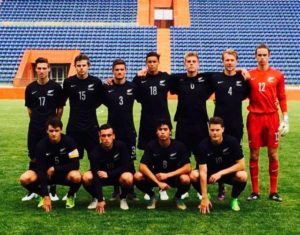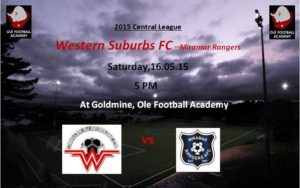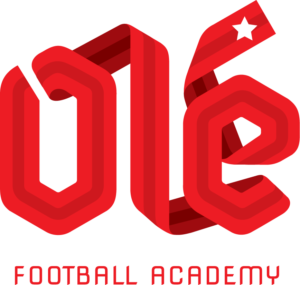An introduction? Hardly necessary. In fact, completely unnecessary.
I was fortunate enough to spend some time with Ryan during his recent visit to Olé. Returning to New Zealand to enjoy the Christmas break with his family, Ryan was very accomodating with his time, even joining in with a training session!
Unsure how to go about conducting an ‘interview’, I felt it best to run through a simple Questions and Answers, allowing an insight of the day-to-day life of being a professional footballer in Europe as well as day-to-day life of a young man from Te Puke living in Holland.
Declan and Harry Edge were present during the questions, with Declan sharing his thoughts as well as asking some questions himself which I have included.
Just for reference, my comments will be in bold, with comments from Ryan and others regular or italics to clearly illustrate a change in speaker. Without further ado-
Have you ever found yourself starstruck in Europe, if so – who was it and what would you have wanted to ask them?
RT: The one person I can remember feeling starstruck by wasn’t actually in Europe, but was [Shinji] Kagawa when we [New Zealand] played Japan in 2014, but he [Kagawa] still played in Germany at the time and didn’t speak any English. So I don’t know what I would have asked him. There aren’t too many stars in Holland.
What about when you played Ajax? Although you did score a brace in the KNVB Cup Final..
RT: Nobody knew any of them.
HE: They probably didn’t want to talk to him [Ryan] either.
You haven’t swapped shirts with anyone?
RT: I’ve swapped shirts with one person, Kamo [Kamohelo Mokotjo] he’s –
HE: It’s gotta be him then!
RT: Yeah, starstruck, but I’m good mates with him so..
Everyone’s always starstruck by Harry.
HE: It’s the smile.
RT: It was better when he had the bleach [hair].
HE: Yeah, I’ve got to do something..
Looking back at your teenage years – now that you’re so old, 22! – did you feel any societal pressures to be ‘social’, or to ‘go out’ and how did you manage that?
RT: To be honest, when I first moved over to live with them [Declan Edge], I went to a Catholic school. I literally had no friends, I used to sit in the library at lunch time reading books. I never had that problem.
Not even in The Tron?
HE: We weren’t old enough.
RT: Surely this next question has got to be for you [Harry], you haven’t answered anything yet!
HE: Go on then!
Did you feel any pressure from your family to be ‘successful’ with football?
RT: Well…
HE: NAH!
(Laughter)
HE: To be honest I didn’t.
What about for you Ryan, in terms of being at Olé and costs involved, did you feel there was an expectation?
HE: It’s a different kind of pressure than that, it would be that I wanted to show my dad that I could do it.
DE: We always saw pressure as being a privilege. We saw pressure as a good thing, not a bad thing. You’ve got to see pressure as a good thing. If you see pressure as a negative then you get worried about it. But if you see pressure as being ‘I need to win this game’, then it’s a good thing.
You have a brand, Ryan, RT30. Will the brand have to change name if you change number?
RT: Yeahhh, kind of.
(Laughter)
RT: To be fair, I would try stay number 30 through my whole career.
What if somebody else is wearing number 30 at a potential future club?
RT: Yeah, that’s the thing.
DE: Go number 3.
(Laughter)
HE: They’ll have to change.
DE: I’m sure somebody at the club, like most people, would be very happy to change the number 30 at their club. It’s not a sought after number to be fair.
RT: There are no trademark names RT30. I just couldn’t be bothered changing my number.
DE: It sounds like something from StarWars.
HE: Did they not offer you to change your number?
RT: The trainer came up to me and said halfway through the second season “You know there’s number 11, number 7 and number 9 free?” And I was like, “Yeah, I know” – I don’t really care. Number 30 is good for me.
You’ve been cursed with a birthday [22nd December] so close to Christmas, did you find yourself getting half the gifts or twice as much?
RT: Half as much. Up until I was around 11 or 12 I was pretty good with it, I didn’t really care. Then I went through that phase like, ‘my brothers and sisters got all these presents and I didn’t.’ So I went through that stupid little kid phase-
Good old ego..
RT: I have apologised to my parents for that.
Really, was it that bad?!
RT: Naah, my parent’s weren’t, y’know, didn’t have that much money – we struggled for a while. They did their best to try and keep everything equal. It was around the time my sister was like 16 or 17, she got a phone and I got just one thing [for my birthday] and another thing for Christmas.
– At this point Dom Wooldridge, Elijah Just, Jaga Scott-Greenfield and Owen Parker-Price have come into the room to chat before heading home after training. They are encouraged to ask questions.
DW: What’s your favourite colour?
RT: Blue!
HE: Say it in Dutch!
OPP: What’s your favourite colour, Dom?
DW: Orange.
HE: Say it in Dutch!
DW: Oranje!
RT: Hey!
HE: Nice!
OPP: Who’s your favourite player?
DW: Iniesta-
HE: He’s not asking you he’s asking Ryan!
(Laughter)
RT: Harry’s my favourite player.
DW: Sorry, I thought that was a question for me.
– Diego, Declan’s dog enters the room.
HE: Hiii, Diegs!
DE: He’s just had his dinner.
HE: Ohh, lovely.
RT: He’s still looking at me eh? He’s not happy. He had a go at my knee, taking me at the weak spot. We used to be best friends us two, me and Diego. We never used to fight.
Everyone else: Diiieeeggggsss, aww!
HE: It’s like he wants to remember you.
RT: Yeah, sometimes he runs to me and then like, goes ‘uhh and stops’.
HE: He wants to remember you. Alright, I’m going for a shower now.
RT: Harry, you’ve answered one question.
HE: Alright, Merry Christmas and a happy New Year.
DW: Merry Christmas.
OPP: Merry Christmas and I’ll see you when I get back Harry!
HE: Enjoy your New Year.
RT: I’m going to the Mount [Mount Maunganui] and I’m going to Rotorua-
DW: Hey! Nando has an B’n’B up there – you should go to it!
RT: He’s got a what?
HE: Who’s that, Nando?
RT: Yeah?!
OPP: He’s got a bed and breakfast.
Just imagine Nando making you breakfast in the morning!
OPP: His dad runs it.
DE: You should DEFINITELY go and stay there the night!
OPP: His dad’s a legend.
DW: His dad’s so nice!
DE: Seriously. If you get the chance to stay for one night. He [Nando’s dad] would ask you every question!
Has anyone else got any questions? I guess you’re all friends on Facebook.
OPP: There was that one time I Facebook called you on accident.
RT: Unbelievable.
DE: You were ringing up Ryan?
OPP: By accident!
(Laughter)
RT: He messaged me after asking all these questions!
OPP: That’s not what happened!
RT: Oh come on!
(Laughter)
OPP: I messaged you first and then accidentally rang you. I was just looking out for you man.
RT: I appreciate it.
– Dom Wooldridge, Elijah Just, Jaga Scott-Greenfield and Owen Parker-Price all express parting gestures – Merry Christmas, have a good New Year – and leave along with Harry Edge.
Did the experience of moving to Olé help in your transition to life in Holland?
RT: I had already done that 3 years earlier when I moved to Declan’s.
Not even moving to a new town with a lot more new players, you would have been more independent?
RT: We just stayed here [at Olé] with Declan, which made everything easier. With Declan towards the end he made us do a lot more by ourselves. During the first six months when I was still at school he would make my food and drop me off at the bus and stuff like that. At the end he said we could start doing that stuff ourselves.
You [Declan] were on the school run?!
RT: Every morning at 7:20 a.m., he would drop us off at the bus.
DE: You look back at it now and I can’t really remember it.
RT: No, neither can I – I can’t even remember going to school! It’s just so I didn’t have any problems with the school. They found out the last week that I was there that I played football with you [Declan]. I was playing for Waikato F.C. in the National League [then ASB Premiership] and they were like “Whoa! Why didn’t you ever tell us you played?!” I just didn’t really feel like playing [for the school].
DE: As soon as the school finds out the kid can play football they would give us a hard time [not playing for the school].
Is playing professional football what you expected it to be, or are there certain challenges you wish you would have known about beforehand?
RT: You know when you’re coming into it that this is people’s jobs and that it is extremely serious. You can train here [Olé] and you think it’s a high level and everyone works hard and all that sort of stuff, but once you get with the ‘big boys’ and training with the first team, reputations are on the line. About two weeks after I got there [PEC Zwolle] I started training with the first team for the first time and barely touched the ball the whole training, I couldn’t create space for myself. My head was spinning around! But the main thing is just seeing that it is a job now. For some players there’s no fun in it anymore. It’s turn up at 9:00 a.m., train at 10:00 a.m. leave at 12:00 p.m. There’s no staying, no enjoyment.
Do you find that more with the older players?
RT: No, it can be anybody. It depends on their situation with the club. It could be their last 6 months of their contract and they’re sitting on the bench, football’s not fun anymore. Like you don’t know if you’ve got a club for next season. You can look at it both ways, ‘I’ll get my head down and start working hard’ or ‘I don’t care whether I play I’ll wait until next season when I find a new club’. Nine times out of ten it’s the players that don’t care that end up dropping down to the Eerste Divisie [First Division] the next season and maybe out of that again the following year to the amateur leagues and then you never see them again 2 years later.
It’s fascinating, that is an element not easily replicated in football here in New Zealand, particularly at an academy. The concept of a contract coming up for renewal, that if you don’t work hard enough you might not be here next year. With Western Suburbs it is always a one-year contract, with an expectation that unless you’re heading abroad you’ll automatically sign on again next year. As well the fact that this is the players’ livelihood, that they cannot get frustrated and give up and just sign with a different club next year, it may transpire that if they do not have the right attitude no club may want to sign them.
DE: You have to try and create that environment as much as you can. Within the programme, within the academy work. That’s why we try to create, like tonight at training, when one team has won you’re trying to create another competition out of the same competition that one team has already won! It’s knowing that when it goes higher up it will be very competitive, you have to keep training that competitive spirit in the player all the time.
Going from footballing obscurity in New Zealand to now professional life in Europe, is it difficult adjusting to public image, interviews, Facebook friend requests and several thousands of followers on Instagram?
DE: That’s actually a good question. You [Ryan] have a public image, particularly in Zwolle. So how do you deal with social media?
RT: At the moment, well, for the rest of my career my Facebook is going to be private. Only family and friends, so literally anything and everything I ‘like’, ‘share’ or ‘comment’ nobody can see unless they’re my ‘friend’. I don’t accept anyone that’s-
DE: Didn’t you say you had somebody that thought they were your friend and tried to contact you on Facebook the other day, what do you do – do you ‘decline’ that?
RT: Yeah, I just don’t look at it, I don’t go into it. I go through, well, 6 months ago probably I went through my ‘friends list’ and I saw people I haven’t talked to, but I know them, the people that you just keep as friends and got rid of them.
DE: And it’s the same with other social media platforms, like SnapChat?
RT: Yeah, SnapChat is only for friends, I don’t put my username on my Instagram or anything so people won’t be able to find me. Instagram is something I have only for the fans, just as a little insight into how a footballer lives.
Do you manage your Instagram account yourself?
RT: Yeah.
DE: So Instagram is where you reach out to the fans, say thank you.
RT: It’s the same as Twitter, it’s only for the fans to say thank you for coming out.
You don’t ever get involved in the comments with your fans?
RT: Nah. At first in the first couple of years everyone loved me, like I couldn’t do anything wrong, so everyone was putting everything on Facebook or Instagram saying ‘we love you’, ‘you’re so good’ and all these sorts of things but now, now that we’ve started playing badly and I’ve been here for a few more seasons they’re starting to rip into me, saying ‘you were rubbish today!’ or ‘you should have done this better’, so ever since I’ve started I’ve sort of just gone away from the comments and that sort of thing. You’re going to get people’s opinions and that doesn’t matter to me.
Does it almost make it more.. real, seeing the media side of things? That everything you do is brought to your attention very quickly, whether you have a good game or a bad game?
RT: That’s the sort of thing I don’t like. You’re just 24/7 getting judged in the public eye no matter what you do. Like, one time when we’re coming back from a game in Rotterdam or something playing at 9 o’clock at night, so we’re getting back to Zwolle at 1 or 2 in the morning and there’s a few fans there, they’re tired, you’re tired and you just want to get home and go to sleep. But there’s a few fans there and they want to talk with you and have a chat, and if you just go they can put that on social media and say ‘this guy’s a ****, we stayed there all night and all we wanted to do was have a talk’. I mean, you can sit there and have a talk but you’re talking for an hour. You’ve sorta gotta learn to just deal with the fact that people, some people are going to think you’re a **** and some will know that you’re a good person.
I guess as well, you want to stay and connect with them but at the same time you’re aware that you can’t. You don’t want them to feel like you don’t care, but at the same time you want to go home, you want to go to sleep – it’s 2 a.m.!
RT: There’s certain things that you’ve got to watch, because they do start making stories out of your words.
In this same scenario, they can be recording your conversation and you’ve got no idea what might appear on social media.
RT: Exactly.
This is probably a good example, I don’t want to scare you from everything, that awareness of everything that you do matters outside of this building.
RT: Yeah, that’s the problem. You can have people that know you and think you’re a good guy, you’re genuine and all that sort of thing. But then if somebody reads that one comment you said that was misinterpreted then for the rest of time, or until they meet you, they’re going to think you’re a ****.
Did you ever feel that when you were learning Dutch, that you would say something that could be misinterpreted?
RT: I never do interviews in Dutch.
What about when you speak to your teammates, are there scenarios where you can say something which makes perfect sense when directly translated to English yet they’ll perceive it differently, negatively?
RT: I can speak Dutch, but there are times when that can happen due to the language barrier. There’s been a couple of times where the reporter will say to me ‘why aren’t you speaking in Dutch?’. There was one instance after a game when we didn’t do too well and I was a little bit frustrated and I said ‘because you guys pull out words and I want to make sure that I’m saying the right thing.’
DE: You don’t do a lot of interviews in the public arena.
RT: No, I talked to the media guy at Zwolle and said any camera stuff, just keep me out of it. You can do that. It’s like Paul Scholes, almost never did an interview. If you don’t like it you don’t have to do it, and that’s the one thing I don’t like about football. I mean, if I was playing for Manchester United and I wasn’t famous I’d be the happiest guy in the world. I don’t like the fame, but at the moment it’s okay because it’s only in Zwolle and I might get noticed in the city people will walk past and go ‘that’s Ryan Thomas!’
I was speaking to your girlfriend before and asked if you could just walk around the street and if anybody would notice you, or is it kind of like you’re at a point where you don’t want to go to the supermarket after a bad game..
RT: It’s starting to get like that a little bit, only in Zwolle. Now that I’m coming up as a better player, one of the top players there when we start playing bad they [the fans] start looking at me. Sometimes I’ve gone to the supermarket the day after a game and a few people have come up to me and said y’know, like ‘what’s going on?’ and ‘what’s the moral like?’, ‘why aren’t you doing this and doing that?’
It’s an interesting point that you can’t really illustrate to young kids here as well, that you’re going through this rise where you’re 21, 22 years old and you’ve got a weight of the town on your shoulders. That’s something you can’t really teach at an academy.
DE: No you can’t, of course you can’t. You have to teach the importance of what football does. The football player at Zwolle, for example, has a huge responsibility of the community, of the town, because they have to win football matches. Because you experience in the supermarket the next day after a bad game that they’re not happy. The job of the football team in the community is to raise the profile and the happiness of the average person.
That’s a point as well, that the fan is physically paying money and spending their time coming to watch you.
DE: The fans are paying your wages. They may not pay the wages through the turnstiles but now they pay the wages through subscriptions to the T.V. We spoke always to the kids when they were young, y’know, don’t forget who pays your wages, it’s the fan. It’s the person that you see in the supermarket and obviously when things are good he’s your friend but when things are bad, you have to deal with those two enemies. When you’re winning football matches, thank you! When you’re losing football matches, thank you!
I had a look through your Instagram before, it’s nice to see that you’re consistent, win, lose or draw you have to keep showing face. It’s nice to see from a fans perspective that you are human, you care and you’re not just going to come out when things are going well.
RT: That’s a little bit of the problem as well, when we’re not doing well it’s difficult to put stuff on Instagram like, when we’re doing well I can put stuff up like a picture of me going for a walk with my dog or going to have dinner with my girlfriend.
DE: But you don’t put that up when you’re losing, it’s like you should be out training!
RT: Exactly, I did it one time, I made that mistake, we hadn’t won in 5 or 6 games and I put a photo up of me going to the movies with my friends, I think it was during my second season. I think it was about 10 of the 30 comments were ‘what are you doing? Get back to training!’
It seems crazy. Similar to other football clubs that you see on social media, when they make a post that is non football related involving players, the comments are usually always negative if the team is not doing well. Was it challenging to come to terms that people are so passionate?
DE: Football is very, very important in Europe. It’s like, I’m going to have a good week this week based on how the local team plays. Like, ‘really?!’ And that’s the way it is.
It reminds me of the movie Fever Pitch where Colin Firth’s character is feeling like his own fortunes are intrinsically linked to that of his own team “See after awhile it all gets mixed up together in your head, and you can’t remember whether life’s rubbish because Arsenal are rubbish or the other way around.”
DE: The people that are in the cities in Europe, the young player understands that more growing up than the Kiwi player. So that’s why you have to keep talking to them during training and over a long period of time is to try, somewhere along the line, so when they go into that environment and they haven’t experienced it, they can think ‘ah, but we were taught that this was going to happen and this is what it’s going to be like’.
I suppose if you go and watch the Phoenix once, it’s not really what it’s going to be like.
DE: That’s not it. You either get it through tradition or you get it through learning. And you can develop it through learning. It’s better through tradition that’s why it’s always a challenge here to develop good, world class players out of New Zealand because there’s no tradition here. But it’s still possible by learning, having an attitude of learning. Ryan’s had to learn fast. He’s had to learn by his parents, had to learn by what he was listening to, y’know, from myself to people trying to say what it’s like, I never painted a nice picture of being a professional football player.
RT: No.
DE: I always painted it like this is really hard work. Like, when people say ‘you can’t do it’ it’s normally because they don’t know how to do it, you can do it. And there is a dark side to the game of football. It’s not just all Ronaldo on T.V. picking up his pay cheque. They [young footballer] need to, not really understand it, but when they experience it they go ‘so this is what it’s like.’
You’re just trying to create that awareness.
DE: Correct. Yeah. Otherwise it’s rubbish, you’re just blowing smoke and that’s what most people do here [New Zealand], because they want to always tell the good side.
I was trying to allude to this when I asked if there is anything you wish you knew before you became a professional footballer. Sometimes you meet people and they say ‘I would love to be a professional footballer, life would be so great’ yet whenever you ever listen to a professional footballer, they say that the highs only last for, not even a minute. It’s not like after you win a game you can really go and celebrate that victory.
DE: I laugh at those people. I laugh at that, when they say ‘I just want to be a professional football player, my life would be so good then.’ Oh, yeah right – really? Like really?! No, you just have way bigger problems!
People can look at somebody like, Wayne Rooney, and say ‘oh, well you earn this much money you should be able to deal with all of this’ but it’s difficult to put it into a perspective, that your life is being scrutinised constantly, 24/7. You’re constantly being judged, you’re constantly being everything – forever! There’s no end point. It’s not like you can pay $1,000,000.00 and everybody stops caring, there’s still that perspective that no matter what you do that’s social, everybody is going to know about it.
DE: And that’s the skill, that’s the price that you pay. You can manage it. There are a lot of players around the world, world class players that have been able to manage that as well. Like Ryan has mentioned Paul Scholes, which is a fantastic example. Michael Carrick. So there’s really really good examples around the world of world class players that have been able to manage that situation. And other people, they love the high life. I’ve always said that the Kiwi player coming from New Zealand should be low profile, working right, emphasising the team, the team, the team, the team. That’s why, like [into the trainings] coming together as a team after scoring a goal.
(Laughs)
DE: But it’s nice! It’s trying to set that into their brainwave when they’re really young that it’s like, ‘No! Don’t go to the corner and give it all that [celebrating on your own]’, it’s the team, the team, the team! I wouldn’t go to Brazil and do that. But for the Kiwi player, the Kiwi player in Europe, is a team player. Very important to the ethos of the team. Look at what, well he’s not really a Kiwi, but Winston [Reid] does play for our national team, but his coach says that he’s a great team player. It’s crucial to the personality of the Kiwi player, so you have to ingrain that.
Particularly as we’re such a young, unknown quantity as a football nation.
DE: Yeah, but then we can change. But the Kiwi is always about team spirit. Look how we fought the first and second world wars and our relationship with the Aussies. It was the ANZAC’s, it was togetherness, it was the brotherhood – it’s who we are. If you have a look at the Italians they cry, and are very emotional – that’s who they are. The Spanish are very animated. The Kiwi, brotherhood, manhood, will stay together – let’s put the fire on and let’s put the barbecue on and that’s who we are. That’s how our national team should be built, around that type of stuff. ‘Cause that’s who we are, that’s what the Kiwi is and the ANZAC’s are. We go first into battle as well! We’re not like, ‘Oh, no no no no no.’ The Kiwi and the Australian go first to fight. Like who, basically who wants to go first? The Spanish say things like; ‘we’ll think about it.’ The Italians go; ‘Hmm, **** that. ‘Cause we don’t want to get dirty, it looks really muddy!’ Whereas the Kiwi and the Australian says, ‘Yeah! **** me, we’ll go first mate!’ And so, you have to build that with the players so when you send the player into Europe like Ryan and others, they have to have those qualities. Because those aren’t the qualities that are in the Dutch player. Those are not the qualities that are in the Italian player. I learn all that just by doing a little bit of study, just by listening to people saying when the Aussies were going into Europe, the time before us. Some Australian players were doing really well, that is what was coming back from the European coaches. ‘These guys are really workman like, we trust them, they come to work everyday they put a good shift in.’ y’know?
Is there much of a New Zealand community of professional footballers in Europe – people like Craig Henderson, Dan Keat, Winston Reid?
DE: Ryan will tell you, like his relationship with Chris [Wood].
RT: Yeah, I’ve known Chris a long time. We grew up in the same area, I’ve known him basically my whole life. I don’t really focus too much on that sort of stuff.
DE: It was a little bit important, when Ryan went over there that we managed to get Harry over there as well to piggyback on, just so you’ve got two of them together for a short period of time. That helps – both of them.
RT: I was lucky with the foster family that I had there at the time, I solely focused on football.
DE: That was lucky. If you go to Zwolle now, there aren’t too many Angelina’s in Zwolle.
RT: Nah.
DE: Like, you find families like that at the club which he did and landed on his feet and went somewhere where people like Heni, he understood football. He would have been a professional football player. They were good, it was good. It was just like, ‘okay they were one of the 35 ducks that need to be in a row’.
RT: I mean, in that first season nothing really went wrong. The first two months I was there we were top of the league and everything we did really well. Then the second half we started losing a few more games.
Do you feel like your perspective is changing now this season, you’re 16th now I think.
RT: Yeah, we’re in relegation now. Like, we’re too good for relegation but then again we’ve been saying that for the past couple of months. You’ve got to realise the situation you’re in but the problem is sometimes they don’t want to fight, they don’t have that team spirit or anything like that. Like, we had a big team meeting with our mental [think psychology] coach a couple of weeks ago when we went like 4 or 5 games losing, and like everyone stands up and says ‘oh, we should be doing this and working hard and fighting for each other’ and all that stuff.
So it’s easy for everybody to create a solution but nobody is actually willing to execute it?
RT: That’s the problem we have right now. Everyone thinks they have the answer, so everyone’s got these opinions, and when one person stands up and says something, then someone else stands up and says a completely different thing, and then the mental coach and the training staff say they’ll put everything together and for about 2 days at training we were good and after that it just goes back to normal [how it was].
It’s funny you say this, it’s like any other football team, professional or not – or any other job!
RT: Yeah..
DE: Yeah.
Like, I remember having these exact conversations at my last job, people would express their opinions and a plan would be created to change things and within days that whole plan was out the window.
DE: You do find certain people, football players, like I’m saying around here; ‘will somebody do something, for a long period of time, consistently?’ Instead of like going and doing something really really brilliantly for about a week. And you can see it [them stop doing it], it’s like ‘oh my god!’ It’s like the old saying, the message to Garcia, if you say you’re going to do something, get it done! Under promise and over deliver.
It’s a good point raised by Ryan Holiday in Ego is the Enemy, Do More vs Be More. It’s very easy to be something, but it’s something else to actually do it!
DE: I listen to what people say, but I watch what people do.
RT: I’ve taken after a lot of what Declan does as well. Like, when I went over, I was 14 when we made the decision and Declan said now’s the time to do it, to go over. I remember when I left my dad just said ‘listen to everything he [Declan] says, just be a sponge. Even if it seems stupid’ – like, he used to come up with some pretty crazy stories and things like that – he [dad] said even if it’s stupid just listen to it. And I’ve literally taken everything back, or, over to Holland now. Basically the player that I am now is because of the things he [Declan] said. Mainly just be the working man’s player. Like, when we had that meeting [with the mental coach] I didn’t say a word. But I still work the most, I work the hardest I still run the most in every game, I still do the most I can for the team.
It’s always inspiring to watch, when a.. ‘talented‘ player on the team puts in the most work. None of that, ‘I don’t need to work hard, I’m the best player, my contract has x amount of years left on it!’ Yet to see someone actually work and fight for the cause, it’s the New Zealand trait. It doesn’t matter if you’re in this situation or that situation, you’re still going to put your head down and get the work done.
DE: That’s the Kiwi. When I went into, thinking about developing Kiwi players, because this is where I chose to live, with this style of play. I had to understand the Kiwi mentality, that’s the style of play and how I work with the New Zealand kid, it had to be based around the Kiwi player. I understand the body shape, I try to understand the personality. I try to understand how they’re playing, the type of player they would be. The Kiwi player is not the roly-poly player from South America, they’re just not here.
RT: There’s maybe, 5 or 6 times when he [Declan] had a big go at me for doing things like, pulling my socks up or when I get kicked rolling on the floor. When he did tell me that stuff, I remember what my dad said, so I would just listen to him and since I’ve been in Europe I’ve never done that stuff, even if I got kicked hard I’d still just get up straight away.
– Declan now departs for dinner
What are your thoughts of Olé a couple of years on – the quality of the players and the culture being instilled?
RT: The quality has definitely improved. Declan knows exactly what he is doing and is constantly evolving and looking for ways to improve himself and the young players in the academy. It’s exciting times for him and the players coming through.
What are your thoughts on the Olé facilities compared to PEC / what you’ve come across during your travels?
RT: Obviously money and resources are different between Olé and PEC, but in saying that the pitch at Olé is great – easily one of the best turfs if not the best that I’ve played on. Being able to stay on campus for a young player to eat, sleep and breathe football is exactly what you need to get on your way to becoming a professional footballer.
What do you get up to away from football?
RT: At the moment not too much. I have a personal trainer away from the club that I go to everyday and other than training at PEC then with him I only rest and recover for the next day. I’ve realised how important that is for a pro to really treat your body like a temple to be able to work on your trade each and every day.
Do you read many books?
RT: The only books I read are books Declan tells me to. So I’m sure the boys in the academy have heard the same thing from Declan and also from Ben.
What are your plans for the festive period?
RT: I’m going to go up to The Mount and relax with my girlfriend and see my granddad.
White Christmas in Europe or BBQ and beach in NZ?
RT: Now that I’ve seen a white Christmas, I really did enjoy it but coming from NZ there’s nothing better than sitting on the beach with friends and family enjoying a nice BBQ.
Any parting thoughts for all the young players as they head off for a break?
RT: Enjoy yourselves. Like I said before, I’ve realised how important it is for your body to recover properly. So take the time to relax and keep your body ticking over with some exercise. If you live away from family, spend as much time with them as you can. Since moving over to Holland I found out how much being away from family can influence your play and how happy you are away from football.
Fin.
Thank you for your time reading through this Q&A with Ryan Thomas, I hope you enjoyed it!
